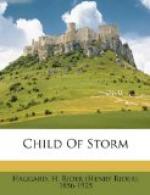When he had finished Maputa raised a spear, whereon the whole regiment, in perfect time, shouted out the royal salute, “Bayete”, with a sound like that of thunder. Thrice they repeated this tremendous and impressive salute, and then were silent. Again Maputa raised his spear, and all the four thousand voices broke out into the Ingoma, or national chant, to which deep, awe-inspiring music we began our march. As I do not think it has ever been written down, I will quote the words. They ran thus:
“Ba ya m’zonda,
Ba ya m’loyisa,
Izizwe zonke,
Ba zond’, Inkoosi."*
[*—Literally translated, this famous chant, now, I think, published for the first time, which, I suppose, will never again pass the lips of a Zulu impi, means:
“They [i.e. the enemy] bear him [i.e. the King]
hatred,
They call down curses on his head,
All of them throughout this land
Abhor our King.”
The Ingoma when sung by twenty or thirty thousand men rushing down to battle must, indeed, have been a song to hear. —EDITOR.]
The spirit of this fierce Ingoma, conveyed by sound, gesture and inflection of voice, not the exact words, remember, which are very rude and simple, leaving much to the imagination, may perhaps be rendered somewhat as follows. An exact translation into English verse is almost impossible—at any rate, to me:
“Loud on their lips is lying,
Red are their eyes with hate;
Rebels their King defying.
Lo! where our impis wait
There shall be dead and dying,
Vengeance insatiate!”
It was early on the morning of the 2nd of December, a cold, miserable morning that came with wind and driving mist, that I found myself with the Amawombe at the place known as Endondakusuka, a plain with some kopjes in it that lies within six miles of the Natal border, from which it is separated by the Tugela river.
As the orders of the Amawombe were to keep out of the fray if that were possible, we had taken up a position about a mile to the right of what proved to be the actual battlefield, choosing as our camping ground a rising knoll that looked like a huge tumulus, and was fronted at a distance of about five hundred yards by another smaller knoll. Behind us stretched bushland, or rather broken land, where mimosa thorns grew in scattered groups, sloping down to the banks of the Tugela about four miles away.
Shortly after dawn I was roused from the place where I slept, wrapped up in some blankets, under a mimosa tree—for, of course, we had no tents—by a messenger, who said that the Prince Umbelazi and the white man, John Dunn, wished to see me. I rose and tidied myself as best I could, since, if I can avoid it, I never like to appear before natives in a dishevelled condition. I remember that I had just finished brushing my hair when Umbelazi arrived.
I can see him now, looking a veritable giant in that morning mist. Indeed, there was something quite unearthly about his appearance as he arose out of those rolling vapours, such light as there was being concentrated upon the blade of his big spear, which was well known as the broadest carried by any warrior in Zululand, and a copper torque he wore about his throat.




